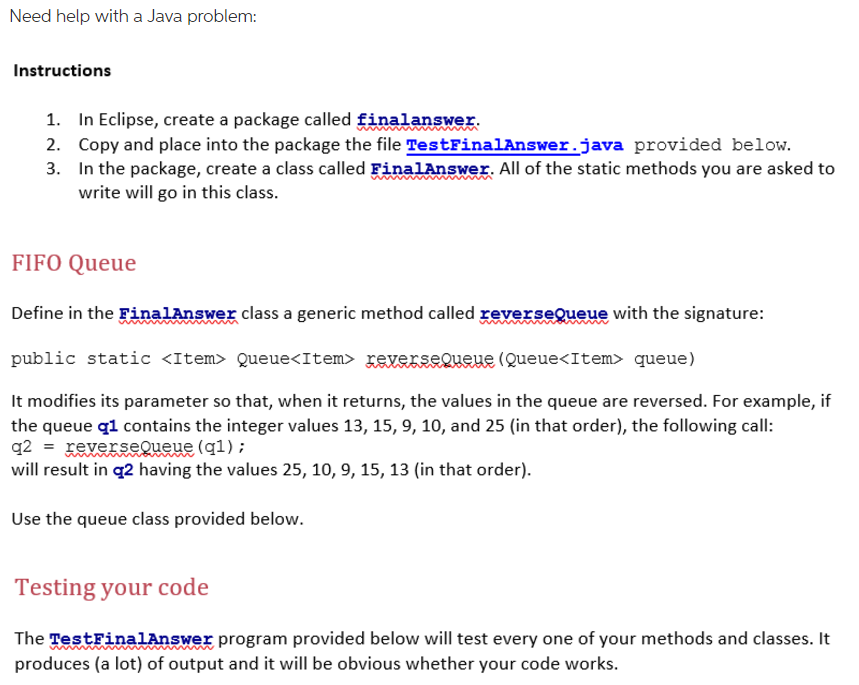Question
Queue.java: import stdlib.*; import java.util.Iterator; import java.util.NoSuchElementException; public class Queue implements Iterable { private int N; // number of elements on queue private Node first;

Queue.java:
import stdlib.*; import java.util.Iterator; import java.util.NoSuchElementException;
public class Queue
// helper linked list class private static class Node
/** * Create an empty queue. */ public Queue() { first = null; last = null; N = 0; }
/** * Is the queue empty? */ public boolean isEmpty() { return first == null; }
/** * Return the number of items in the queue. */ public int size() { return N; }
/** * Return the item least recently added to the queue. * @throws java.util.NoSuchElementException if queue is empty. */ public T peek() { if (isEmpty()) throw new NoSuchElementException("Queue underflow"); return first.item; }
/** * Add the item to the queue. */ public void enqueue(T item) { Node
/** * Remove and return the item on the queue least recently added. * @throws java.util.NoSuchElementException if queue is empty. */ public T dequeue() { if (isEmpty()) throw new NoSuchElementException("Queue underflow"); T item = first.item; first = first.next; N--; if (isEmpty()) last = null; return item; }
/** * Return string representation. */ public String toString() { StringBuilder s = new StringBuilder(); for (T item : this) s.append(item + " "); return s.toString(); }
// check internal invariants private static
// check internal consistency of instance variable N int numberOfNodes = 0; for (Queue.Node
// check internal consistency of instance variable last Queue.Node
return true; }
/** * Return an iterator that iterates over the items on the queue in FIFO order. */ public Iterator
// an iterator, doesn't implement remove() since it's optional private class ListIterator implements Iterator
public boolean hasNext() { return current != null; } public void remove() { throw new UnsupportedOperationException(); }
public T next() { if (!hasNext()) throw new NoSuchElementException(); T item = current.item; current = current.next; return item; } }
public void toGraphviz(String filename) { GraphvizBuilder gb = new GraphvizBuilder (); toGraphviz (gb, null, first); gb.toFile (filename, "rankdir=\"LR\""); } private void toGraphviz (GraphvizBuilder gb, Node
/** * A test client. */ public static void main(String[] args) { StdIn.fromString ("to be or not to - be - - that - - - is"); Queue
TestFinalAnswer.java:
package finalanswer;
import java.util.ArrayList;
import java.util.Arrays;
import java.util.Random;
import stdlib.StdIn;
import stdlib.StdOut;
public class TestFinalAnswer {
public static
for (int i = 0; i
if (a[i].compareTo(a[i+1]) > 0) return false;
}
return true;
}
public static void main(String[] args) {
StdOut.println("*** " + FinalAnswer.yourName() + " ***");
StdOut.println();
Integer[] array = new Integer[12];
Random r = new Random();
for (int i = 0; i
array[i] = r.nextInt(1000);
}
StdOut.println("Array before sorting: " + Arrays.toString(array));
FinalAnswer.minpqSort(array);
StdOut.println("Array after sorting: " + Arrays.toString(array));
StdOut.println("Array is sorted: " + isSorted(array));
StdOut.println();
Queue
queue.enqueue("first");
queue.enqueue("second");
queue.enqueue("third");
queue.enqueue("fourth");
StdOut.println("Queue before reversing: " + queue);
FinalAnswer.reverseQueue(queue);
StdOut.println("Queue after reversing: " + queue);
StdOut.println();
double[] frequencies = {110.0, 110.0*1.224, 110.0*1.224*1.224};
ArrayList
for (Chord risingChord: risingChords) {
StdOut.println("Playing: " + risingChord);
risingChord.play();
}
StdOut.println();
ArrayList
StdIn.fromFile("data/CTAdata.txt");
while (!StdIn.isEmpty()) {
int runNumber = StdIn.readInt();
String lineColor = StdIn.readString();
String nextStation = StdIn.readString();
String arrivalTime = StdIn.readString();
ctaTrains.add(new CTATrain(runNumber, lineColor, nextStation, arrivalTime));
}
StdOut.println("--- Trains before sorting ---");
for (CTATrain ctaTrain: ctaTrains) {
StdOut.println(ctaTrain);
}
StdOut.println();
ctaTrains.sort(null);
StdOut.println("--- Trains after sorting by run number ---");
for (CTATrain ctaTrain: ctaTrains) {
StdOut.println(ctaTrain);
}
StdOut.println();
ctaTrains.sort((CTATrain t1, CTATrain t2) -> (t1.getArrivalTime().compareTo(t2.getArrivalTime())));
StdOut.println("--- Trains after sorting by arrival time ---");
for (CTATrain ctaTrain: ctaTrains) {
StdOut.println(ctaTrain);
}
StdOut.println();
StdOut.println("=== " + FinalAnswer.yourName() + " ===");
}
}
Need help with a Java problem: Instructions 1. In Eclipse, create a package called finalanswer. 2. Copy and place into the package the file TestFinalAnswer.java provided below. 3. In the package, create a class called FinalAnswer. All of the static methods you are asked to write will go in this class. FIFO Queue Define in the FinalAnswer class a generic method called reverse eue with the signature public staticStep by Step Solution
There are 3 Steps involved in it
Step: 1

Get Instant Access to Expert-Tailored Solutions
See step-by-step solutions with expert insights and AI powered tools for academic success
Step: 2

Step: 3

Ace Your Homework with AI
Get the answers you need in no time with our AI-driven, step-by-step assistance
Get Started


